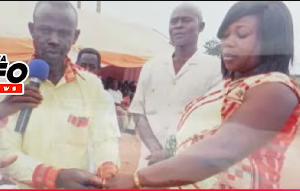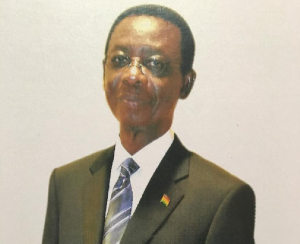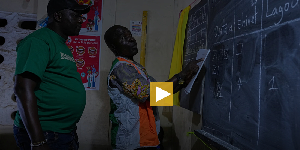As I sit watching Channel 4 television here in London, UK, on the screen appears a harrowing woman of African extraction sitting on a raffia mat with legs stretched forward on the floor in a scene of what appears to be an overcrowded hospital ward with a badly ill child sitting on her laps apparently suffering from malaria; a nurse in attendance. A male voice recites a rhetorical message in such declamatory tone that arouses sympathy and evoke alms-giving. This indeed is a UNICEF advert from a scene set at the Tamale hospital in Ghana, West Africa aimed at pleading to human sentiments of willingness to help in charity for the plight of children like Amina, a Ghanaian in such deprived and poverty-stricken communities of the world where disease, malnutrition, high infant mortality, illitracy, potable water is in dearth; where communities, young and aged are forced by a natural desire to live do drink dirty water from guineaworm infested ponds and pools. These instances as above are neither isolated to only the North, nor are they sporadic but pervade across every community in Ghana. International communities of the world respond in empathy to donate generously in cash and in kind, even including those on dole queues who irrespective of their financial disability feel the urge to give lose coins and even notes for such courses. With all these done, do ask yourself how far and how much care do your governments attach to the plight of the poor and indigent in Ghana as they set out on a spree of plofligacy spending?
Though poverty is a world-wide phenomenon, many ponent countries provide paliative measures designed to reduce its intensity yet sucessive governments in Ghana show no sign of helping let alone without coming to terms with what has caused so much hard pinching poverty over the years, let alone finding ways to remove such causes. Dependency on the benevolence of foreign aid as acts of kindness which lie beyond their duty in the sense of any moral requirement is known to all. The duty of care to the people of Ghana is the unshirkable responsibility owed by the government of Ghana by virtue of the social contract tradition which requires citizens to obey the command of their rulers. If indeed governments were caring, which incorporates a sense of duty, it would equally be be seen as a sense of justice; to be specific, economic justice for all but not empowerment of selected cronies at the expense of all others. Moderately affluent and indeed the few rich families of Ghana, including government Ministers and appointees lie outside this vicious sufferance bracket
The much pontificated Savannah Accelerated Development Authority (SADA) that was copied from the Northern Development Authority (NDA) would have achieved a glorious welcome and success had the government embarked upon it in good faith in regard to the fact that a vortex of ‘savannarisation’ is sweeping through Ghana, decimating our one time verdand forest vegetation that sustained cocoa production on more than half of Ghana’s landmass. SADA is seen to be characterised in bad faith by reason of the fact that the government has linked the breeding of guinea-fowels by one selected person with a sponsorship of US$15 million. In fact, there would be no problem if, as it is perceivably manifested, most poor communities are located within the savannah regions, these were identified and indeed sponsored with even US$10 thousand as seed money to initiate a sort of positive discrimination in caring for and alleviating poverty in even one selected community. This would be a kind of affirmative action though that which could not be passed without contention and objection by opponents. If indeed this is the mode of care prepared to palliate poverty with an aim to alleviating the socio-economic hardships plaguing the savannah communities is what is meant by the Savannah Accelerated Development Authority, then, I condemn it is a misnomer with the reason that the tentacles of this mode are too short, narrow, infantile, limited, personalised with no accelerative organ to propel speed and all-inclusiveness.
The fact remains that, government cannot afford caring for every poor person in Ghana with US$15 million however, considering the fact that most poor Ghanaian communities and individuals depend on agriculture for their means of livelihood, a conscientious leader in government would identify and sponsor an all-inclusive viable agriculture project that would reap benefits for all and the country’s economy. This doesn’t imply that business-minded individuals and or groups with creative proactive foresight must not be assisted in kind to advance projects of community and national economic interest. A similar bad faith disingenuous and dishonest SADA fiasco story is told about US$10 million for tree planting to obviate an insidiously threatening Sahel drift southwards whereby a contractor precaciously concedes to knowingly planting stumps of seedlings in the scorched dry season climate of the North.
Here indeed is a government in whose administration there are more appointed officials from the selfsame Reagional communities of the North that are projected the poorest and need more care; whose sense of care is more of commonsense egoism with not the least of rational egoism. These are commonsense egoistic appointees who promote their own personal good beyond the morally permissible threshold, neglecting the plight of the people they claim to care about. In soliciting to be elected to the highest office of the land, by using the most politically incorrect expression, John Dramani Mahama disregarded the ethics on political platforms to ask for entitlement to be overwhelmingly voted for in the North because he is a Northerner, a deprived community of Ghana, supposedly to be accorded a Mosaic disposition to lead all of them out of deprivation and poverty in Ghana. John, to the dismay of his Northerners whom he saw as gullible, rather said so with a different agenda
In seeking to help his people out of abject poverty, Right Honourable Alhaj Tanku Abdul Rahman, Prime Minister of Malaysia, out of an honest benevolent altruistic dispensation, realising that Malaysia primarily depends on agriculture, had long appreciated the plight of the poor peasants in his country and sought for an agriculture crop beyond their traditional crop production. He sought for a crop from which a lot could be derived through added value for export and indeed a crop that individuals could participate in producing as a means of economic empowerment for all. With this as his prime objective, on his visit to Ghana in 1957, Mr Tanku expressed interest in palm fruit for palm oil production. Today, Malaysia is the world’s largest palm oil producing country processing products such as bio-mechanical fuel and oils, margarine and scores of non-industrial benefits and products from the crop. Though not indigenous to their respective countries, like a cocoa farmer in Ghana, the average Malaysian is a proud owner of a sizeable palm oil farm, the proceeds from which the farm owner is reasonably better off. It is expected of government officials and appointees to sit up in appreciation of the fact that poverty and indigence in Ghana, most especially in the North and on relative terms its prevalence in all other parts of Ghana is a real challenge that needs addressing.
Ghana sits on huge deposits of natural resources including its richness of crop-producing soil yet Ghanaians are economically handicapped by reason of our penchant to selecting irresponsible leaders and officials. So much blame is levelled on colonisation of Ghana by the British and their exploitation of our natural resources for well over 150 years therefore in the opinion of some people it should be the responsibility of Britain to strive to alleviate poverty and socio-economic hardships in Ghana. It is equally hardly acknowledged that once independent, Ghana as a moral community lies outside the responsibility of any former Colonial Masters. Successive governments have largely depended on foreign grants and loans for Ghana’s development, leaving a huge debt burden for even the unborn generations whiles our leaders bask in riches out of such contracted loans. It is therefore our failure to react to irresponsive thick-skin and uncaring administrations that reflect our priorities; so ultimately it is our lifestyles which augment our cause of continuing poverty. A typical example is government spending on inordinate number of Ministers, deputy Ministers, ministries of no relevance, high executive and parliamentarians’ salaries etc. Visiting of any type of suffering on people out of human creation through corruption, dishonesty and disingenuity is evil.
My quest, not just for caring for the poor in Ghana but transforming our socio-economic deficiencies into strength empowerment and prosperity may seem to have no solution in the minds of the ordinary thinker because Ghanaians have become attuned to some sort of divine and indeed serendipitous magical solution to human-related problems. Since caring has an unquantifiable dimension to moral responsibility, it is believed that if there is a proper appreciation of the facts of poverty in Ghana, appreciation of our national moral identities, of the moral seriousness of responding to extreme suffering, of what quality of life really means and of the duty of caring as much as we can in our official capacity in relation to quality of life, then, we would care as much as we ought. The assuring hope is that, as much as poverty is a human creature, it takes human ingenuity to kill it. Nobody was born to be poor and no community was designed to suffer undignified indigence. There is a solution to Ghana’s poverty alleviation sitting in the pipeline that will emerge anon.
Adreba Kwaku Abrefa Damoa; (London, UK)
Opinions of Monday, 20 May 2013
Columnist: Damoa, Adreba Kwaku Abrefa














